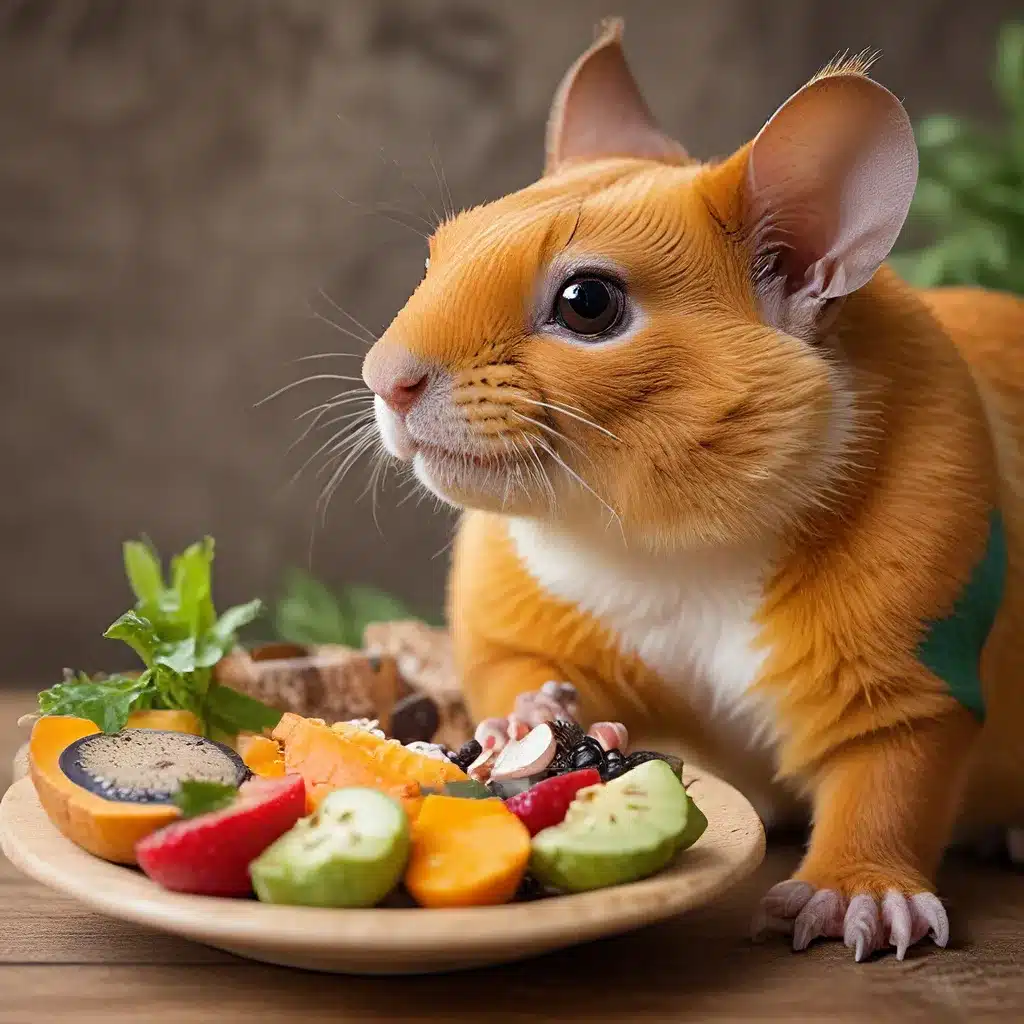
Ah, the wonderful world of exotic pets! From feathered friends to scaly companions, these captivating creatures have a special way of capturing our hearts. But as any experienced exotic pet owner knows, keeping these unique animals healthy and thriving requires a delicate balance – and that all starts with their diet.
The Diverse Dietary Needs of Exotic Pets
When it comes to exotic pets, the old adage “one size fits all” simply doesn’t apply. These fascinating creatures come from all corners of the animal kingdom, and with that comes a wide array of dietary preferences and nutritional requirements.
Take birds, for instance. These feathered friends are primarily seed-eaters, but to truly thrive, they often need a varied diet that includes fruits, veggies, and even the occasional protein source. On the other hand, reptiles are a diverse bunch, with some species happily munching on insects while others prefer a leafy green salad, perhaps with a sprinkle of juicy fruit for dessert.
As the experts at Content Critter explain, “Understanding these distinctions is fundamental to ensuring your exotic pets receive adequate nutrition.” After all, what might be a delectable delight for one species could be a deadly danger for another.
Striking the Right Balance: Macronutrients and Supplements
Navigating the complex world of exotic pet nutrition is no easy feat, but it’s a crucial part of being a responsible pet parent. One of the key considerations is ensuring your scaly, feathered, or furry friend is getting the right balance of macronutrients – that’s the fancy term for proteins, carbohydrates, and fats.
“Feeding exotic pets involves striking the right balance of macronutrients including carbohydrates, proteins, and fats,” the experts at Content Critter advise. “While the proportions may vary depending on the species, ensuring an appropriate mix is crucial for their health.”
For example, insect-eating reptiles like bearded dragons need a diet that’s high in protein, while herbivorous species may thrive on a more fiber-rich regimen. Monitoring portion sizes and tweaking the composition of your pet’s meals can make all the difference in keeping them in tiptop shape.
But macronutrients aren’t the only consideration when it comes to exotic pet nutrition. Many species also require targeted supplementation to meet their unique nutritional needs. “Calcium, vitamin D3, and other vitamins and minerals may need to be added to their diet, especially for species with specialized requirements or those kept indoors,” the Content Critter experts explain.
The Importance of Variety and Enrichment
As any seasoned exotic pet owner knows, simply providing the right balance of nutrients isn’t enough. These captivating creatures also crave variety and mental stimulation to truly thrive.
“Enrichment through foraging activities, puzzle feeders, and varied food items can stimulate natural behaviors and mental stimulation, promoting overall well-being,” the Content Critter experts advise.
Imagine if your diet consisted of the same bland, repetitive meals day in and day out. Your mental health and overall well-being would surely suffer. The same is true for our exotic companions. Introducing new and exciting food items – while still maintaining a nutritious, balanced diet – can do wonders for their physical and emotional health.
Avoiding the Dangers: Toxic and Harmful Foods
Of course, keeping your exotic pet healthy and thriving isn’t just about providing the right nutrients – it’s also about being vigilant about what you don’t feed them. As the Content Critter experts warn, “Some common human foods such as chocolate, caffeine, and avocado can be deadly for certain species.”
And it’s not just the obvious culprits we need to watch out for. Even seemingly harmless fruits and veggies can pose a risk if they’re contaminated with pesticides or herbicides. “It’s essential to research and avoid feeding any potentially harmful foods to ensure the safety of your pets,” the experts advise.
So, before you start tossing those table scraps to your feathered or scaly friend, it’s crucial to do your homework. A little bit of caution can go a long way in keeping your exotic companion happy, healthy, and (most importantly) alive.
Consulting the Experts: Tailoring Diets for Your Unique Pet
At the end of the day, ensuring your exotic pet’s nutritional needs are met is no simple task. With so many species, so many dietary preferences, and so many potential pitfalls, it can feel like navigating a minefield – one wrong move, and the consequences could be dire.
That’s why it’s so important to consult with the experts, whether it’s your veterinarian or a specialist in exotic pet nutrition. As the Content Critter team advises, “Consulting with a veterinarian or a specialist in exotic pet nutrition can help you tailor a diet plan that promotes optimal health and longevity for your feathered or scaly companion.”
After all, your exotic pet’s well-being is too precious to leave to chance. By working closely with the professionals, you can create a customized feeding regimen that ensures your captivating companion stays happy, healthy, and thriving for years to come.
And who knows – with the right nutrition and care, maybe your exotic pet will even develop a few personality quirks that’ll have you laughing (and shaking your head) for days. After all, the joy of owning an exotic pet is in the unexpected!
So, whether you’re a seasoned exotic pet owner or just starting your journey, remember: a balanced diet is the key to keeping your feathered, scaly, or furry friend in tip-top shape. With a little bit of research, a lot of love, and the guidance of the experts, you can ensure your captivating companion lives their best life.
Now, who’s ready to explore the wonderful world of exotic pet nutrition? Golden Exotic Pets is here to help you every step of the way!

